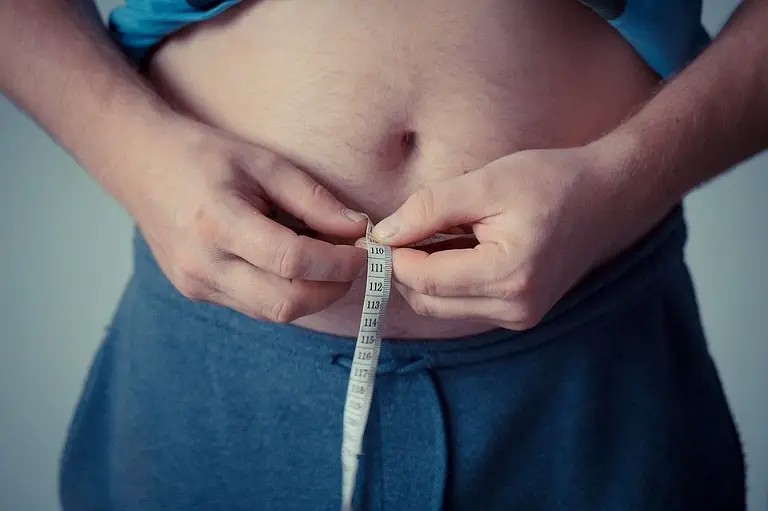It’s a widespread belief that testosterone is primarily associated with muscle building, yet research indicates that this male hormone can also contribute to weight loss.
Testosterone for Weight Loss
Hormones serve as crucial messengers within the body. Among them, testosterone, primarily produced in the testicles, stands as a pivotal hormone.
Testosterone plays a multifaceted role in various life stages, extending beyond just building muscles. During puberty, it contributes to the development of masculine traits like increased muscle mass, height growth, and a deeper voice.

In early adulthood, testosterone levels peak, governing mood, sexual desire, fertility, bone density, and body composition. It also influences fat distribution across the body.
Normal testosterone levels for men typically range from 300 to 1000 ng/dL, with the peak androgen hormone production occurring during late adolescence. These levels stabilize in the 20s and experience a gradual decline in the 30s.
While age-related testosterone decline is inevitable, maintaining a healthy lifestyle through regular exercise, quality sleep, and proper nutrition remains crucial for supporting optimal hormone production.
Understanding Testosterone Deficiency in Men
When testosterone levels fall below the 300 ng/dL threshold, it’s classified as abnormally low and referred to as hypogonadism.
Men grappling with low testosterone levels may exhibit a range of symptoms, including diminished sexual desire, erectile dysfunction, reduced cognitive sharpness and agility, and even depression.
They might also experience decreased productivity, reduced energy levels, and the loss of facial, pubic, and underarm hair. Muscle mass can dwindle, and excess body fat, particularly around the abdominal region, can accumulate, altering their typical masculine appearance.
Each of these manifestations can significantly impact one’s overall well-being, with many men reporting disruptions in their daily lives.
While age-related testosterone decline primarily affects older men and often goes untreated, it’s worth noting that a modern, stress-filled lifestyle characterized by inadequate physical activity, poor dietary habits, and high stress levels can also disrupt hormone balance.
In fact, researchers have identified a connection between low testosterone levels and obesity.
Testosterone Deficiency and Its Link to Obesity
Obesity carries substantial health risks, including conditions like heart disease, cancer, diabetes, osteoarthritis, and chronic kidney disease, all associated with excess body fat. It’s been observed that obesity can shorten life expectancy and potentially reverse the progress made by previous generations in terms of health.
Interestingly, there exists a reciprocal relationship between testosterone and obesity, where one can influence the other.
Obesity can lead to lower testosterone levels, but conversely, low testosterone levels may contribute to obesity.
Testosterone plays a crucial role in shaping body composition, as it promotes muscle growth while facilitating the loss of fat.
Consequently, men with higher testosterone levels often exhibit a leaner physique compared to those with lower testosterone levels.
This dynamic operates as a double-edged sword, as men grappling with low testosterone are more susceptible to weight gain.
The Impact of Excess Weight on Testosterone Levels
It is widely believed that obesity can result in a 30% reduction in testosterone levels among men, with over 70% of them potentially experiencing hypogonadism, a condition with significant implications considering the vital role of testosterone.
Fortunately, there is a silver lining: shedding excess weight can help restore testosterone levels.

While the exact mechanisms by which obesity affects testosterone remain somewhat unclear, multiple studies propose that visceral abdominal fat may play a pivotal role. This type of stubborn fat accumulates around the abdomen, often a concern for many men.
Visceral fat is known to contain elevated levels of aromatase, an enzyme responsible for converting testosterone into estrogen. Carrying excess belly fat can lead to an increase in your body’s natural estrogen levels.
Although this may not sound alarming, it’s crucial to bear in mind that estrogen is a predominantly female sex hormone, and an imbalance between estrogen and testosterone can result in undesired consequences.
One such consequence is gynecomastia, a condition characterized by the enlargement of breast tissue in men, which can give a more feminine appearance.
How Low Testosterone Can Contribute to Obesity
There’s a theory suggesting that individuals with low testosterone levels may be at a higher risk of weight gain due to muscle loss.
Optimal testosterone levels support protein synthesis in muscles, but when testosterone is deficient, it can result in muscle breakdown. This shift in body composition favors fat accumulation over muscle.
With fewer muscles to demand energy, the calories from food are more likely to be stored as body fat. In essence, the body’s energy needs decrease as a result.
Ways to Boost Testosterone Levels
Enhancing testosterone production offers clear advantages for fat loss, but hormone management can be complex without proper guidance.
Prior to pursuing medical interventions, there are several lifestyle adjustments to consider.
Before turning to testosterone replacement therapy, explore various alternatives to naturally increase androgen levels.
Engage in Regular Exercise
Physical activity plays a crucial role in maintaining a healthy lifestyle. You don’t need to engage in intense gym workouts to improve your fitness; activities like outdoor walks can suffice.
Research has shown that physically active men tend to have a more favorable hormonal environment and better sperm production compared to sedentary individuals. Interestingly, exercise is particularly effective for increasing testosterone levels in obese men, even more so than weight loss diets alone.
The key factor in raising testosterone through exercise is intensity. Short-term responses to resistance workouts, especially those exceeding 70% intensity, can significantly boost testosterone levels. Additionally, an eight-week strength-training program has been shown to increase total testosterone.
High-intensity strength training is not only beneficial for strength but also for fat burning. Weightlifters with lean body compositions burn calories efficiently during weightlifting sessions, particularly when performing compound exercises that engage multiple muscle groups.
In conclusion, incorporating strength training into your fitness routine can be a highly effective means of increasing testosterone levels.
Consider Dietary Supplements
Maintaining a balanced diet is an effective strategy to support healthy testosterone production. Dietary supplements offer a convenient way to ensure you obtain essential nutrients and avoid deficiencies.
Specifically, zinc and vitamin D are crucial for men’s health, as they not only contribute to overall well-being but also play a role in testosterone regulation, especially when levels are insufficient.
Experts concur that individuals with inadequate intake of these nutrients are more likely to experience reduced androgen levels. Additionally, there are specialized testosterone boosters like Testogen that incorporate a combination of these ingredients.
Testogen, in particular, includes various natural compounds known to elevate testosterone levels, exerting a synergistic effect to enhance hormonal balance.
Conclusion: Testosterone for Weight Loss
Testosterone has the potential to offer more benefits beyond muscle development. Extensive research establishes a distinct link between testosterone and weight management.
While testosterone isn’t the sole determinant of effective weight loss, it undeniably plays a significant role. Obesity and diminished testosterone levels share a close association, mutually affecting each other.
Elevated testosterone levels can make a substantial contribution to weight loss, and conversely, addressing weight concerns can positively impact testosterone levels.
